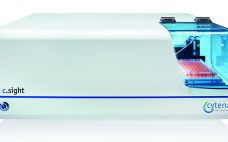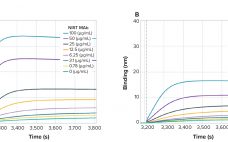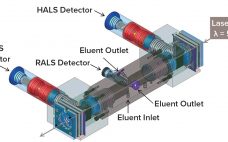Clonal cell line development is a crucial step in a number of applications, including generating biopharmaceuticals (e.g., monoclonal antibodies, MAbs). Current workflows in cell line development have major drawbacks such as missing proof of clonality, inefficient single-cell isolation, and reduced cell viability. The single-cell printer™ technology offers documented assurance of clonality and provides efficient and fast single-cell seeding combined with excellent cell viability and zero risk of cross-contamination. All cytena products support SLAS/SBS format 96-well and 384-well plates. Different typical…
Industry Innovators 2019-2020
High-Throughput Sialylation Screening on an Octet Label-Free Instrument: Expediting Clone Selection in Cell Line Development
A high-throughput method for relative screening of terminal sialic acid content was developed on the Octet platform to expedite cell line development. The method is based on the use of ForteBio’s sialic acid (GlyS) kit to bind sialic acid on glycoproteins. The GlyS kit can screen specifically the sialylation levels of secreted proteins in crude cell culture samples and does not require purified samples. Using this method, 96 crude cell culture samples can be screened for sialylation in 60 minutes…
Gene Editing: A Step Change in Biopharmaceutical Manufacturing
The natural characteristics of Chinese hamster ovary (CHO) cells have contributed to their use as the dominant expression platform in biomanufacturing. To increase the capabilities of these host systems, fundamental improvements to the CHO cell line are needed, which is where we believe that gene editing can offer a step change in biopharmaceutical manufacturing. Fill out the form below to read the complete technology review now.
Addressing Key Attributes of Viral Vectors
Adeno-associated viruses (AAVs) are the most commonly used type of viral vector applied in gene therapy trials to date (1). From a regulatory perspective, an understanding of the critical quality attributes (CQAs) that impact product safety, purity, and potency is required. Specific analytical assays to assess vector productivity, vector purity, biological activity, and safety are required to generate data to ensure that the vector is produced with the consistency necessary to ensure safety and prevent undesired affects (2) on patients’…
Contract Testing Services: Solutions Through Experience
An extensive suite of contract testing and development services combines Sartorius Stedim Biotech’s expertise in cell line development, bioanalytical testing, and biosafety contract testing to support customers from cell line development through to product manufacture and release. Broadening our portfolio of products and technologies, these services enable a comprehensive “total solution” to support our clients’ drug development activities. Benefit from our extensive experience to efficiently advance your drug candidates quickly from early stage development through to commercialization. Based on unparalleled…
Tosoh LenS3™ MALS Detector: A New Paradigm in Light-Scattering Technology
The multi-angle light scattering (MALS) technique has become the standard for determining molecular weight (MW) and size (radius of gyration, Rg) of proteins, biopolymers, synthetic polymers, and polysaccharides. By combining an extreme low angle (low-angle light scattering (LALS) – 10°) and an extreme high angle (high-angle light scattering (HALS) – 170°) with a right angle (right-angle light scattering (RALS) – 90°) to form a three-angle MALS detector, the new LenS3 detector can determine directly absolute molecular weight and Rg without…






